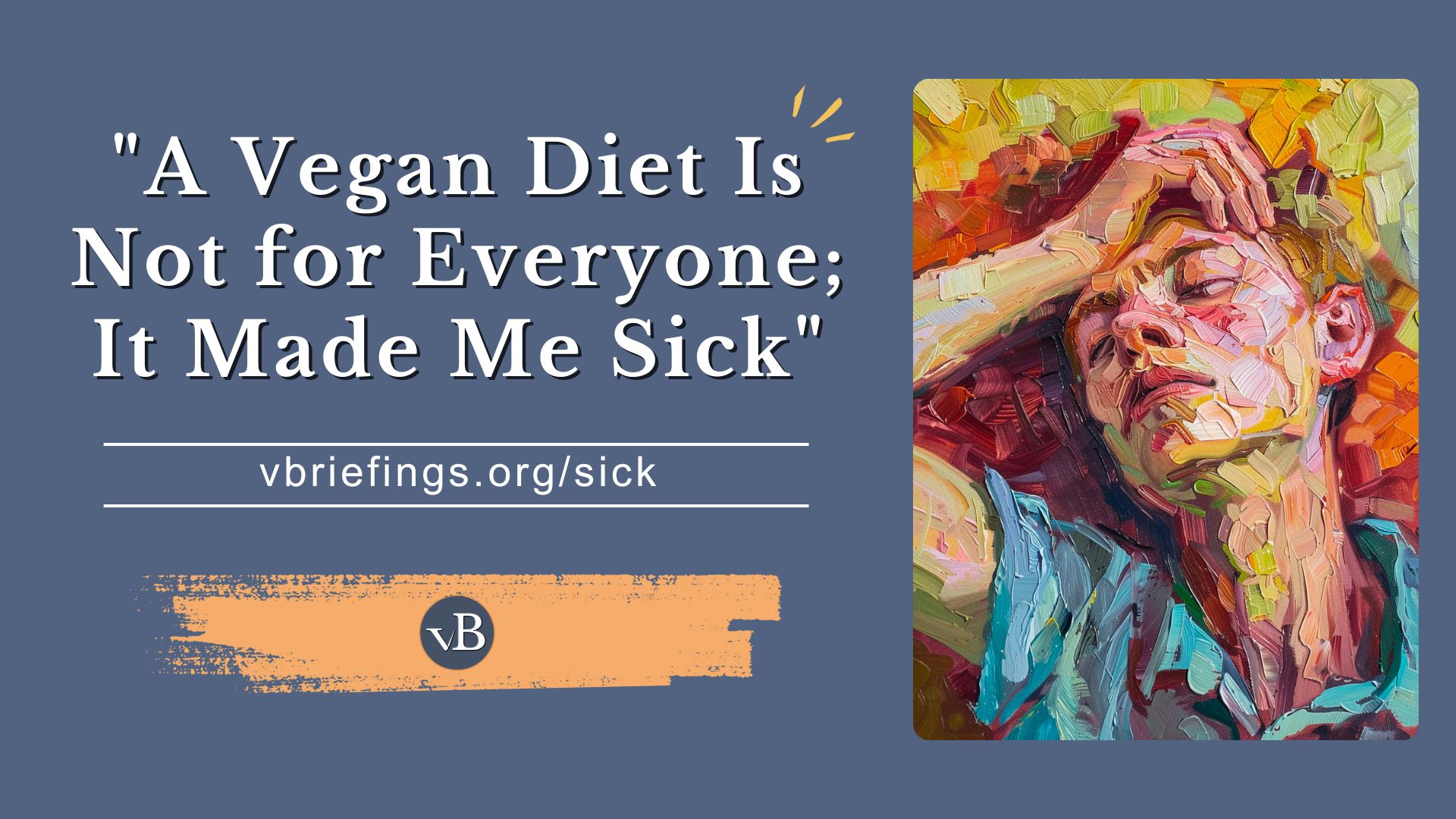Preface
Briefing description and more.
We provide possible reasons for why you may not be feeling well on your vegan diet.
Companion Videos
How to use companion videos
Videos may be posted on multiple social media platforms, and you can share them on each platform according each platform’s conventions.
Share this Briefing
Social Media Sharing Image
This image will be used when sharing the briefing on a social media platform. You can see all social sharing images in the grid view.

How to share this briefing
Click on the icon for the platform on which you wish to share. What happens next depends on the platform, but generally a popup will appear, letting you add your own text as you share.
Briefing Meta
Metrics
Note: we will publish additional briefings after completing flashcards and presentation slides for selected briefings.
Counts:
| Main Text | |
| Key Points | 11 |
| Counterclaims | 0 |
| Supplementary | 0 |
| Further Study | 2 |
| Footnotes | 9 |
| Media & Advocacy | |
| Advocacy Notes | 12 |
| —Socratic Questions | 18 |
| Flashcards | 0 |
| Presentation Slides | 0 |
| Memes & Infographics | 0 |
| Companion Videos | 0 |
Other Meta:
Date Posted:
Last Edited:
Edit Log:
Key Points Links
Loading…
Help Us Improve
Please send your suggestions for improvements, or report any issues with this briefing to team@vbriefings.org
We appreciate that you are taking the time to help up improve. All suggestions and reports will be carefully considered.
Summary
A concise summary of the briefing (see below for citations).
Feeling unwell on a vegan diet can result from factors like insufficient calories, over-reliance on processed foods, new food sensitivities, or underlying health issues. While individual needs vary, there is no scientific evidence that animal products are necessary, and initial discomfort may ease as the body adjusts. Health experts agree that a vegan diet can be healthy and protective against chronic disease, though supplementation may be needed to address potential nutrient gaps—a consideration for anyone, not just vegans. Negative experiences can often improve on a second attempt, but some may use an undiagnosed illness as an excuse or misattribute symptoms as a reason to abandon veganism.
Context
Places this topic in its larger context.
Occasionally we hear of someone who says they got sick, didn’t feel well, or lacked energy on a vegan diet. While this is the opposite of what most new vegans experience, it’s heard enough to warrant a response.
More often than not, these kinds of assertions are made without a professional diagnosis. And without a diagnosis, it’s hard to say the cause of this for any one individual. Determining the cause of a condition is a complex process best left to your doctor.
Nevertheless, we examine some possibilities and try to shed a little light on the topic, offering the following points gleaned from firsthand reports, personal experience, and those qualified to weigh in.
Key Points
This section provides talking points.
Keep in mind that we know of no nutrients that must come from animal products.
When the Academy of Nutrition and Dietetics, Mayo Clinic, Harvard Public Health, Cleveland Clinic, and others say1 that plant-based diets are adequate and even advantageous, they do not say “except that certain people must have meat, dairy, or eggs.” Nor do they qualify their statements by pointing out nutrients that are difficult to obtain unless you eat animal products.
Science knows of no nutrient that cannot be obtained—and obtained in sufficient quantities for good health—outside the animal kingdom.
Your malady may be caused by something other than your diet in general or your vegan diet in particular.
When you combine the fact that people get sick or feel bad for a multitude of reasons with the fact that self-diagnosis is often wrong, it seems at least possible that your troubles may not be caused by a vegan diet—or even by any diet at all. People get sick all the time and attribute that to various reasons, often without adequate justification.
Bio-individuality does not confer a need for animal products.
Sometimes the claim is made that because we are all different a vegan diet is not for everyone. It’s true that bio-individuality may justifiably cause you to restrict or supplement your diet, but such restrictions have no connection to a vegan diet.
For example, if you have an allergy, you should avoid foods that trigger that allergy. If you have absorption problems with any particular nutrient, you may want to supplement for that nutrient. If you are prone to kidney stones, you may decide to restrict oxalate.2
But there is no scientific basis for saying that any given individual should not eat vegan because that individual is unique.
Some attempts to link physical or physiological traits to an optimum diet (attempts such as the blood-type diet) are regarded by the scientific community as lacking credibility.3
Your body may need more time to acclimate.
Your body may need more time to adjust to the new way of eating. Some feel sickly and weak when they first start on a vegan diet. Then, as their body adjusts, these feelings go away and the nutritional advantages of a plant-based diet start to be realized.
You may be eating too much vegan junk food.
The science is clear that leaving animal products off the plate reduces your risks for chronic disease,4 but that alone does not guarantee a healthy diet.
You might not be getting enough nutrients because you are consuming too much vegan junk food, such as Oreos, potato chips, and cola.
You may not be getting enough calories.
Animal products and vegetable oils are calorie dense, while fruits and vegetables are nutrient dense.
It takes a higher quantity of fruits and vegetables to fill a stomach with any given amount of calories than it does to fill a stomach with meat.5
So if you are eating the same volume of plant foods as you previously ate of animal foods, it’s possible you are not getting enough calories.
You may have introduced a food that causes a mild allergic reaction.
When you adopt a vegan, plant-based diet, it’s likely you will be eating a number of foods you didn’t previously consume. It’s possible that one of those foods will contain an allergen.
Your body might need a different mix of macronutrients
If your metabolism is high or you are an endurance athlete, you might benefit from a higher percentage of complex carbs.
If you are a bodybuilder or you have a job that constantly rips muscle tissue that needs to be rebuilt, you may need more protein.
You may be deficient in vitamin B12 or other nutrients.
Note: Nutrient deficiencies are a common concern and not just a concern for vegans. Americans are commonly deficient in 9 nutrients, according to the US Office of Disease Prevention and Health Promotion (ODPHP).6
Vitamin B12
Note: See our briefing on vitamin B12 for more information.
This critical nutrient is perhaps the only nutrient for which there seems to be universal agreement that vegans need to supplement. Known symptoms of B12 deficiency include fatigue and weakness, but a deficiency can also lead to more serious disorders.7
If you started a vegan diet recently, your chance of being deficient in B12 is probably small unless you started with a deficiency. This is because your body normally stores enough to last well over a year.8
Other Nutrients
Depending on your particular vegan eating pattern, it’s likely some nutrient requirements will be better met, but some may be lacking, especially if you consume a lot of vegan junk food. We recommend reading Nutrition Tips for Vegans by registered dietitian Jack Norris.
You may be using the vegan diet as an excuse, subconsciously or not.
It’s likely true that some people have health-related issues that are triggered by the transition to a vegan diet. But it’s also likely that in some cases, such issues are used as an excuse to give up on their vegan diet. And for some, this could be on a subconscious level.
Humans are experts at rationalization, as Ben Franklin realized when he said, “So convenient a thing is it to be a reasonable creature, since it enables one to find or make a reason for everything one has a mind to do.”9
Some do well on the second attempt.
Some have reported that on the second attempt at eating vegan, they did not experience any problems and instead felt better, as most of us have experienced.
Given the benefits of veganism to the animals, the planet, the starving and impoverished, and your own health, please consider trying again, taking into consideration the information presented above.
Counterclaims
Responses to some yes but retorts.
Counterclaims are often not included in objection-type briefings because the objection itself functions as a form of counterargument.
Supplementary Info
Additional information that may prove useful.
None provided.
Further Study
Sources providing a deeper understanding of the topic or related topics.
Other Resources
As mentioned earlier, we recommend reading Nutrition Tips for Vegans by registered dietitian Jack Norris.
Advocacy Resources
Information to help with outreach and advocacy.
Note: we will publish additional briefings after completing flashcards and presentation slides for selected briefings.
Share This Briefing
Cloned from the Preface Section on page load.
Companion Videos
Cloned from the Preface Section on page load.
Memes and Infographics
No images found.
How to use Memes and Infographics
To sequence through all memes and infographics on this page, click on any image than use the arrow keys or the arrow buttons to show next and previous images.
To share a meme or infographic, right click on the image and choose download or save as. Then upload the image to the platform of choice.
Presentation Slides
Slides not available.
How to Use the Presentation Slides
You can view the slideshow full screen by clicking on the first link above.
To use Canva presenter mode, view the speaker notes, or download the slides as PowerPoint, login to Canva (the free account works) and follow the Full Canva Link provided above.
To copy this presentation to your own Canva project, use the Full Canva Link provided above, then select File->Make a Copy from the upper left. You can build your own unique presentation from multiple briefings by copying the presentation from each briefing and then building another presentation from the copied presentations.
Flash Cards
We partner with Brainscape because of their excellent features for learning. You will need to create a free Brainscape account to study the cards.
Go to Flash Cards: This will take you to a list of decks.
About Flash Cards and Brainscape
Flash cards are here to help you commit important facts and concepts in this briefing to memory.
In Brainscape, there is one deck for each briefing. You can study more than one deck at a time. Brainscape uses spaced repetition to promote memory retention. It is “the secret to learning more while studying less.”
You can study using your browser, but Brainscape also has a free mobile app that makes learning anywhere easy.
Socratic Questions
Socratic-style questions are embedded in the Advocacy Notes below, and shown in italics.
These are open-ended, thought-provoking questions designed to encourage critical thinking, self-reflection, and deeper understanding. They are inspired by the Socratic method, a teaching technique attributed to the ancient Greek philosopher Socrates, who would ask his students probing questions rather than directly providing answers.
The goal is to help people examine their beliefs, clarify their thoughts, uncover assumptions, and explore the evidence and reasoning behind their ideas.
Advocacy Notes
Tips for Advocacy and Outreach
General Tips
Some people claim that they became sick or felt unwell on a vegan diet, using this as justification for abandoning it. Your goal is to help them examine the real reasons for their experience, separate fact from misconception, and consider trying again with better knowledge.
Segue the Conversation Back to Animal Ethics
- “If you could eat a nutritionally complete vegan diet and feel great, would you still prefer to contribute to the suffering animals?”
Shift the Focus to What’s Causing the Issue, Not Just the Diet
People often assume veganism is the cause of their symptoms, but many factors can contribute to feeling unwell.
- “How do you know for sure that your symptoms were caused by your diet and not something else, like stress, an underlying health issue, or a nutrient deficiency that predated your transition?”
- “If someone eats an unhealthy diet while vegan, wouldn’t that explain feeling sick more than veganism itself?”
Why? This encourages critical thinking about what really caused their symptoms instead of blaming veganism outright.
Challenge the Assumption That Animal Products Are Necessary
Some people believe that their symptoms prove they need meat, dairy, or eggs. Help them see that there is no scientific basis for this claim.
- “Did you know that the Academy of Nutrition and Dietetics, Harvard Public Health, and the Cleveland Clinic all say a vegan diet is nutritionally adequate for all stages of life?”
- “If there were nutrients that could only come from animal products, wouldn’t major health organizations warn people against vegan diets?”
Why? This forces them to question whether their symptoms really indicate a biological need for animal products.
Address the Possibility That Their Body Was Adjusting
Some people experience temporary discomfort when transitioning to a new diet, but this often resolves with time.
- “When switching to any new diet—vegan or not—the body needs time to adjust. Did you give yourself enough time before deciding it wasn’t for you?”
- “Would you quit exercising after one workout because your muscles were sore? What if your body just needed time to adapt?”
Why? This helps them see their symptoms as part of an adjustment period rather than a sign that veganism doesn’t work for them.
Show That a Poorly Planned Vegan Diet Can Cause Issues—Just Like Any Diet
Many assume that simply removing animal products guarantees good health.
- “Was your vegan diet based on whole foods, or did you eat mostly processed vegan products?”
- “Just like an unhealthy omnivore diet can cause health issues, wouldn’t an unhealthy vegan diet do the same?”
Why? This shifts the conversation to diet quality rather than just plant-based vs. animal-based foods.
Highlight That Not Eating Enough Calories Can Cause Fatigue
Some people under-eat after going vegan because plant-based foods tend to be lower in calories.
- “Did you adjust your portion sizes to make sure you were eating enough, or were you eating the same volume of food as before?”
- “If meat and dairy are calorie-dense, wouldn’t cutting them out without replacing those calories make you feel weak?”
Why? This helps them see that feeling low-energy may have been due to calorie intake, not the diet itself.
Address the Possibility of an Undiagnosed Food Sensitivity
Some new vegans introduce foods they previously ate rarely, not realizing they may have a sensitivity.
- Did you add foods like soy, nuts, or legumes that you hadn’t eaten much before? Could one of those have caused an issue?”
- “If a new food was making you feel unwell, wouldn’t it make more sense to adjust your choices rather than abandon veganism altogether?”
Why? This encourages a more nuanced approach instead of blaming veganism as a whole.
Explain That Nutrient Deficiencies Are a Concern for Everyone, Not Just Vegans
People often assume that feeling unwell means that they were missing something only found in animal products.
- “Did you know that nutrient deficiencies are common across all diets, not just vegan ones? Even meat-eaters can be low in B12, iron, or omega-3s?”
- “If a nutrient deficiency was the problem, wouldn’t supplementing or adjusting your diet have been a better solution than giving up?”
Why? This reframes the issue as a general nutrition concern, not an argument against veganism.
Challenge the Idea That Bio-Individuality Requires Animal Products
Some claim that veganism isn’t for everyone because people have unique dietary needs.
- “If dietary needs vary that much, why do major health organizations say a vegan diet is suitable for all life stages?”
- “Needing to adjust your nutrient intake doesn’t mean you need animal products—so why assume veganism is the problem?”
Why? This reveals that dietary flexibility does not require abandoning ethical food choices.
Point Out That Many People Thrive on a Second Attempt
Some who quit veganism find that when they try again with better knowledge, they succeed.
- “If you knew there were ways to fix the issues you faced last time, would you be open to trying veganism again?”
- “Many people struggle on their first attempt because they don’t know how to get the right balance of nutrients—what if you gave it another shot with more guidance?”
Why? This plants the idea that their experience does not have to be final.
Leave Them with a Thought-Provoking Question
If they resist, don’t argue—leave them with something to consider.
- “Now that you know many people adjust and thrive after a second attempt, would you reconsider?”
Why? A strong question stays with them long after the conversation ends.
Footnotes
Our sources, with links back to where they are used.
- Citations for these organizations and more can be found on our briefing on vegan diets ↩︎
- Norris, Jack. “Oxalate.” VeganHealth.org, 6 Feb. 2025, veganhealth.org/food-allergies/oxalate/. Accessed 6 Feb. 2025. ↩︎
- Cusack L, De Buck E, Compernolle V, Vandekerckhove P. Blood type diets lack supporting evidence: a systematic review. Am J Clin Nutr. 2013 Jul;98(1):99-104. Epub 2013 May 22. PMID: 23697707. ↩︎
- Our briefing on vegan diets clearly shows that there is a scientific consensus regarding this. ↩︎
- Jeff Novick, MS, RD. “Calorie Density Approach to Nutrition and Weight Management.” Forks over Knives, 19 June 2012. ↩︎
- “Scientific Report of the 2015 Dietary Guidelines Advisory Committee, Part D Chapter 1.” Health.gov ODPHP, 2015. ↩︎
- Vitamin B12, Mayo Clinic, July 17, 2021 ↩︎
- Folate, Institute of Medicine (US) Standing Committee on the Scientific Evaluation of Dietary Reference Intakes and its Panel on. ”Estimation of the Period Covered by Vitamin B12 Stores”. National Academies Press (US), 1998. ↩︎
- “Franklin, Benjamin. The Autobiography of Benjamin Franklin. AmazonClassics, 2017. 48-49 ↩︎




